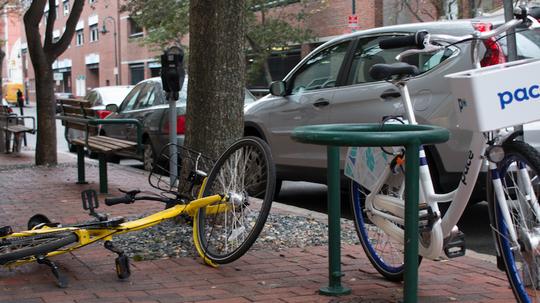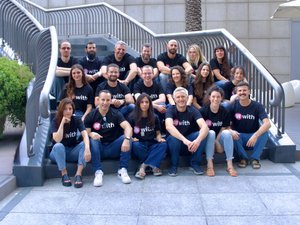
Every day I walk to the train station, I notice them everywhere: dockless shared bicycles. Some are neatly clustered together. Some are knocked down.
But despite any semblance of clutter on Malden's sidewalks, the introduction of dockless bike-share programs from Ofo and LimeBike has had some positive impact. I see people in town riding the streets with them daily. One night, I looked out my apartment window and saw a group of friends hooting and hollering as they partook in the bike-share phenomenon.
For Malden, a city outside Boston, the effect has been transformative, but the intense spending by venture capital-backed bike-share companies, especially in China, has raised the question of whether dockless bike-share is sustainable. A photo published in The Guardian earlier this week gave one potential answer: a massive, multicolored junk heap of bikes.
Chinese bike share graveyard a monument to industry's 'arrogance' https://t.co/wGuxBHe8Zs pic.twitter.com/RTK4dyq9tf
— Prof Chris Oliver (@CyclingSurgeon) November 25, 2017
Zagster, a Cambridge startup that has been offering bike-share programs since 2007, has a new approach to the dockless bike-share craze: a program that comes with the flexibility of dockless without any of its drawbacks, according to the company. The new program, which was introduced on Thursday, comes after the company hired Wayfair's former CFO in September and raised a $10 million Series B financing round in January.
One of the largest advantages of dockless bikes is that you can pick them up and drop them off anywhere — a capability made possible by a locking technology in the bike's back wheel that is connected to a smartphone app. But this can lead to problems. Since bikes can be dropped off anywhere, they can fall over and clog up sidewalks. It also creates a reliability issue where you never quite know if a bike will be close enough on any given day, though you can at least use your smartphone to try and find one.
With Pace, the name of Zagster's new bike-share program, the Cambridge startup is looking to solve those problems while providing the same flexibility that lets you stop anywhere in between destinations, which has been an issue with traditional docked bike-share programs.

While Pace comes with designated low-cost bike racks where you can pick up and drop off bikes, the program's standout feature is a cable that lets you tether the bike to any fixture — as long as it's legal — whether it's in the middle or at the end of your trip. Like other dockless bikes, each bike has a ring lock around the back wheel that is controlled by a smartphone app. If Pace's designated racks get too low on bikes, company staff will retrieve bikes left elsewhere and replenish the racks. Trips start at $1 per half hour.
To Timothy Ericson, founder and CEO of Zagster, this has a few benefits: it gives people a reliable place to find bikes while also giving them the flexibility to make stops and lock up the bikes anywhere there is a fixture. This can also help cities reduce bike-share clutter.
"We believe very strongly that bikes should be locked to things," he said.
Zagster currently provides 200 bike-share programs across 35 states, Ericson said, with 98 of them serving cities and college campuses. Unlike Pace, the current programs require Zagster rides to begin and end at the company's designated bike racks.
"Zagster has become a vital and integral component of our city’s existing transportation network."
Ericson said Pace is aimed at Zagster's city and college customers while the company's corporate customers, which includes Salesforce and General Motors, will remain under the Zagster brand. The company is planning to launch its first Pace programs before next April in Tallahassee, Fla.; Albuquerque, N.M.; Rochester, N.Y.; Knoxville, Tenn.; and Huntsville, Ala. Ericson said all of Zagster's current city and college programs will eventually convert to Pace.
To ensure Zagster was taking the right approach with Pace, the company tested the program in Rochester over the last few months and found promising results. The company found that when compared to docked bike-share programs like Hubway, Pace saw an 800 percent increase in ridership in its first 90 days of service. The program also received positive feedback in surveys.
"With the arrival of Pace, the success we’ve seen by offering our citizens a flexible, modern bike-share service can be brought to other cities across the country," Rochester Mayor Lovely A. Warren said in a statement. “In its first season of operations in Rochester, Zagster has become a vital and integral component of our city’s existing transportation network and shown its willingness to be a true community partner."








